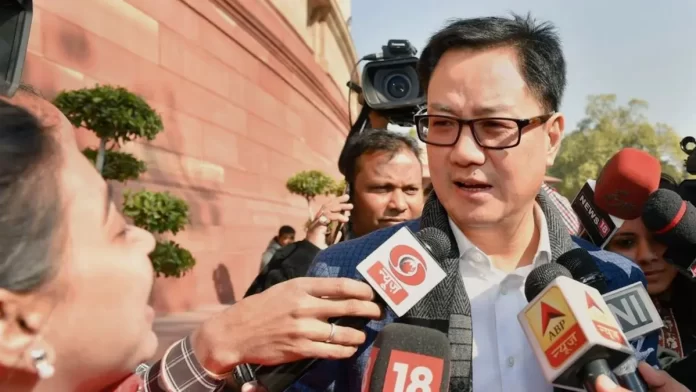No time frame has been prescribed for the disposal of various kinds of cases by the respective courts, said Union Law Minister Kiren Rijiju on Thursday, adding that the disposal of pending cases in courts is entirely within the domain of the judiciary.
He said that the Government has no role in the disposal of cases in courts. Timely disposal of cases in courts depends on several factors which, inter-alia, include the availability of an adequate number of judges and judicial officers, supporting court staff and physical infrastructure, the complexity of facts involved, nature of evidence, cooperation of stakeholders viz. bar, investigation agencies, witnesses and litigants and proper application of rules and procedures.
“There are several factors that may lead to delays in the disposal of cases. These inter-alia, include vacancies of judges, frequent adjournments, and lack of adequate arrangement to monitor, track and bunch cases for hearing”, he added.
He also said that the Central Government is fully committed to speedy disposal of cases in accordance with Article 21 of the Constitution and reducing pendency.
“The Government has taken several initiatives to provide an ecosystem for faster disposal of cases by the judiciary”, said the law minister.
National Mission for Justice Delivery and Legal Reforms
Talking about the National Mission for Justice Delivery and Legal Reforms, the law minister said that it was set up in August 2011 with the twin objectives of increasing access by reducing delays and arrears in the system and enhancing accountability through structural changes and setting performance standards and capacities.
He said that the Mission has been pursuing a coordinated approach for phased liquidation of arrears and pendency in judicial administration, which, inter-alia, involves better infrastructure for courts including computerization, increase in strength of subordinate judiciary, policy and legislative measures in the areas prone to excessive litigation, re-engineering of court procedure for quick disposal of cases and emphasis on human resource development.
Virtual Hearings in Higher Courts
Addressing the Parliament, the Law Minister also talked about facilities for virtual hearings are available in the Supreme Court as well as in the High Courts of the country.
He said that since the Covid-19 lockdown started, the District courts heard 1,11,40,223 cases while the High Court heard 60,21,688 cases (totaling 1.71 crores) till 31.01.2022 using video conferencing.
The Supreme Court held 2,18,891 hearings till 14.03.2022 since the beginning of the lockdown period.
He said that to bring about uniformity and standardization in the conduct of Video Conferencing (VC), an overarching order was passed by the Hon’ble Supreme Court of India on 6th April 2020 which gave legal sanctity and validity to the court hearings done through VC.
Further, VC rules were framed by a 5-judge committee which was circulated to all the High Courts for adoption after local contextualization. A total of 23 High Courts have implemented Video Conferencing rules.
One video conference equipment each has been provided to all Court Complexes including taluk level courts and additional funds have been sanctioned for additional VC equipment for 14,443 courtrooms.
Funds for setting up 2506 VC Cabins have been made available. Additional 1500 VC Licenses have been acquired. VC facilities are already enabled between 3240 court complexes and corresponding 1272 jails.
A sum of Rs. 7.60 crore has been released for procurement of 1732 Document Visualizers.
Virtual hearing of the cases by the High Courts and the Supreme Court has helped the litigants including the underprivileged litigants as it helps litigants to appear before the court from any location of their choice thus leading to considerable saving of time and money.
It also helped the entire legal ecosystem including vulnerable litigants to have recourse to the justice delivery system, particularly during the Covid pandemic when the congregational mode of court hearings could not be held due to lockdown and social distancing protocols.
However, whether open physical courts will operate along with virtual hearings is an administrative matter which falls within the purview and domain of the judiciary for taking a decision.
